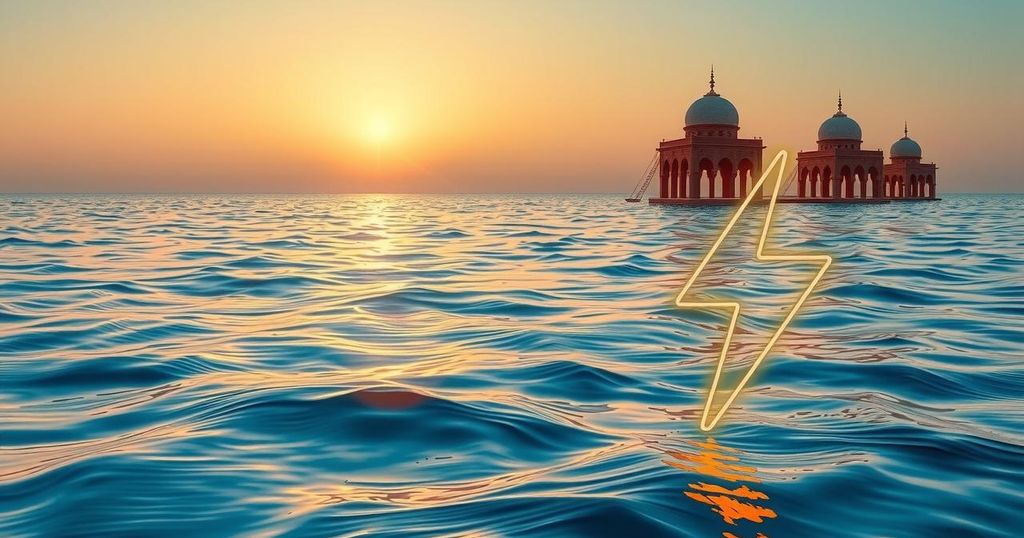Ukraine and Russia to Discuss Black Sea Ceasefire and Energy in Saudi Arabia

Ukrainian and Russian delegations will meet in Saudi Arabia on March 24 to discuss a ceasefire, focusing on the Black Sea and energy. No direct contact will occur between them, with negotiations taking place through intermediaries. The talks aim for a maritime ceasefire, while Ukraine calls for a comprehensive agreement amidst previous disruptions to grain exporting agreements. The situation remains delicate and prone to setbacks.
On March 24, ceasefire talks involving Ukrainian and Russian delegations will occur in Saudi Arabia, but without direct contact between the two parties. This arrangement underscores the significant divisions that persist, despite the optimistic view from the White House regarding potential peace. The Washington Post reported this development.
Yuri Ushakov, a key foreign policy aide to Russian President Vladimir Putin, noted that the discussions will address proposals for a maritime ceasefire in the Black Sea. Participants will communicate through intermediaries while working in separate rooms. “They are going to be proximity discussions … sort of like shuttle diplomacy in a hotel,” remarked Keith Kellogg, the former special representative for Ukraine and Russia under Donald Trump.
Currently, Ukraine is advocating for a comprehensive ceasefire without any preconditions. In contrast, Putin has endorsed a narrower proposal that limits the ceasefire to halting attacks on energy infrastructure. Samuel Charap, a Russia analyst at the Rand think tank, highlighted the delicate nature of the ceasefire, suggesting it is “the most sensitive and prone to derailment. We should expect zigzags,” indicating the likelihood of setbacks in negotiations.
Andriy Stavnitser, CEO of Ukraine’s leading port, TIS, expressed skepticism about reaching agreements with Russia. He noted previous sabotage attempts to push Ukraine out of global markets, stressing the necessity for international observers, ideally from the U.S., to ensure compliance during any agreements.
The grain supply in the Black Sea will also be on the agenda. An agreement from summer 2022 allowed Ukraine to export grain from ports, but this has faced multiple disruptions. Russia has accused Ukraine of using safe corridors for drone strikes, ultimately leading to a suspension of the agreement a year later.
The Russian delegation in Riyadh will comprise Grigory Karasin, a senator responsible for foreign affairs, and Sergey Beseda, an advisor from the Federal Security Service. Ukraine’s representatives will be Defense Minister Rustem Umerov and Deputy Head of the President’s Office Pavlo Palisa, accompanied by specialists focused on energy and port infrastructure.
American mediators include Michael Anton, the policy planning director working under Secretary of State Marco Rubio, alongside aides to Kellogg and representatives from National Security Adviser Michael Waltz’s office. Ushakov confirmed that both U.S. and Russian delegations would participate in negotiations in Riyadh on March 24. President Zelenskyy also announced that Ukrainian and U.S. technical teams would convene in Saudi Arabia on the same day.
Kellogg mentioned that the U.S. intends to facilitate separate meetings with Ukrainian and Russian representatives, organizing indirect communication. On March 21, Ukraine’s Ministry of Foreign Affairs spokesperson Heorhiy Tykhyi confirmed that the Ukrainian delegation would meet with the American team in Saudi Arabia but would not engage in direct talks with the Russians.
The discussions in Saudi Arabia on March 24 represent a strategic attempt to address ongoing hostilities between Ukraine and Russia, with a focus on maritime ceasefire and energy-related issues. While Ukraine is pushing for a broader ceasefire, Russia’s narrower proposal raises doubts about potential agreements. The presence of international observers and a commitment to indirect negotiation formats highlight the complexities and sensitivities surrounding these talks. The outcome remains uncertain as skepticism persists from key Ukrainian officials regarding Russia’s reliability in past agreements.
Original Source: global.espreso.tv







